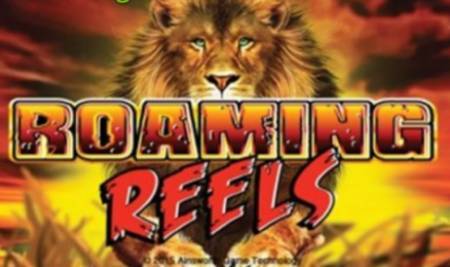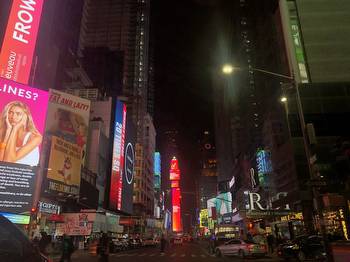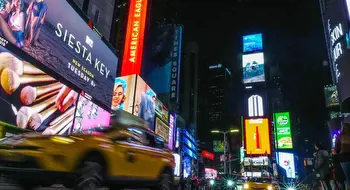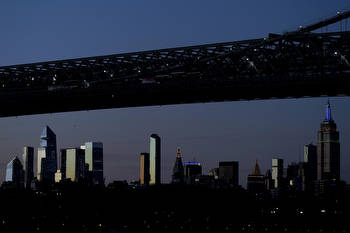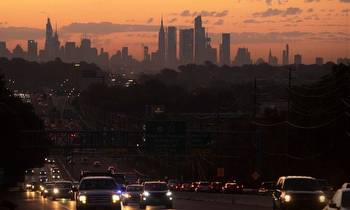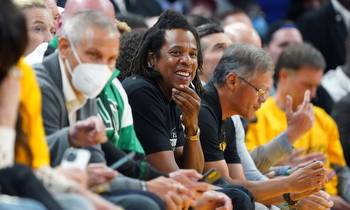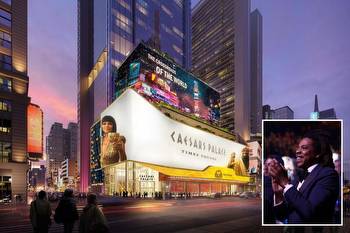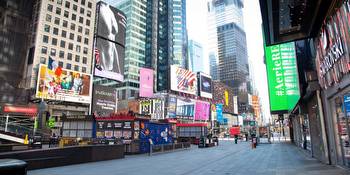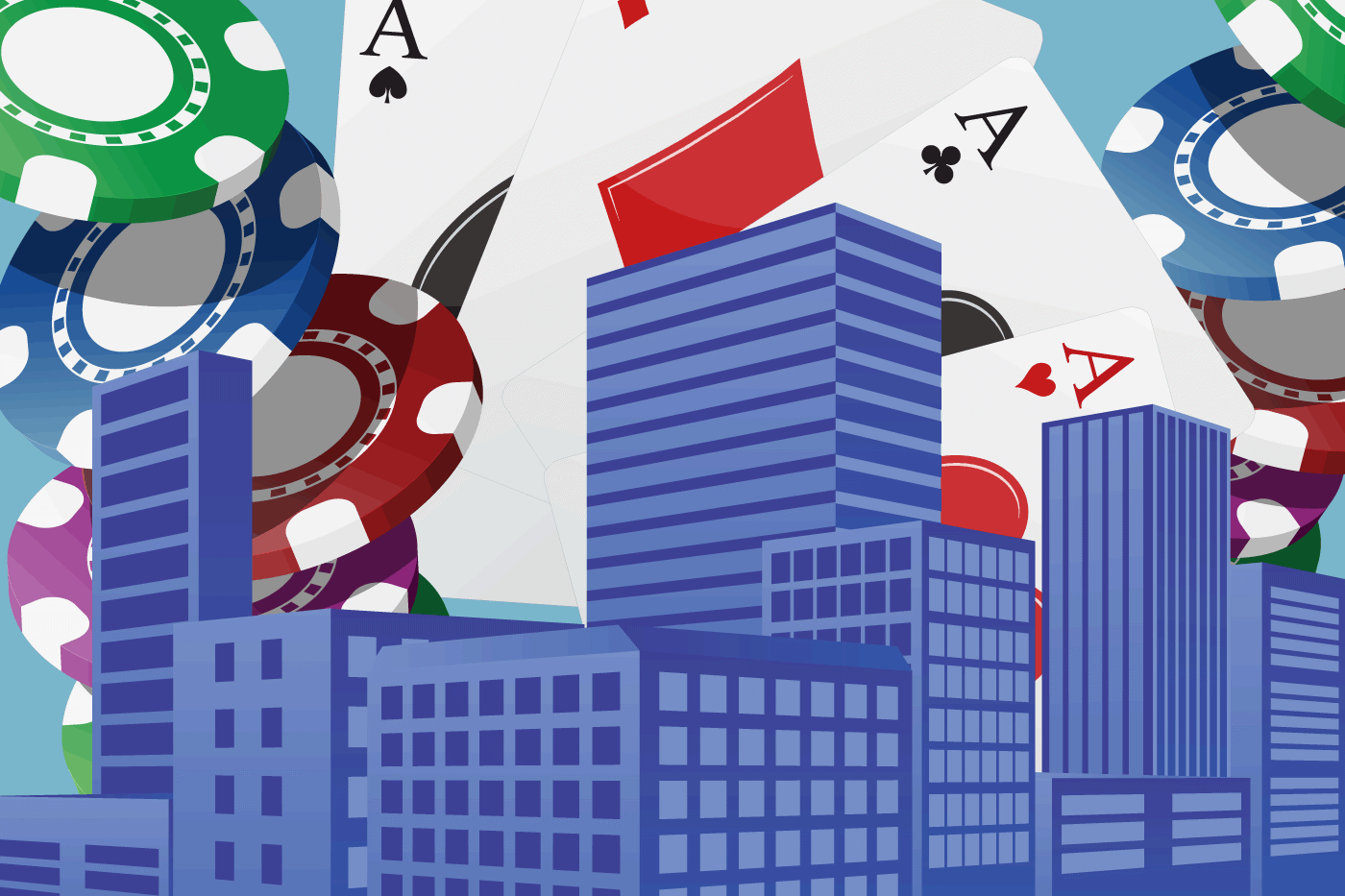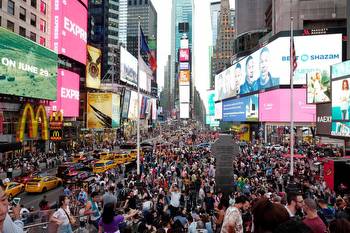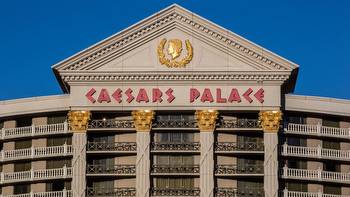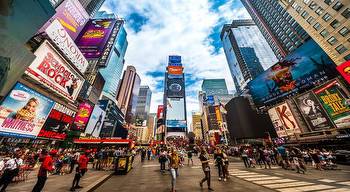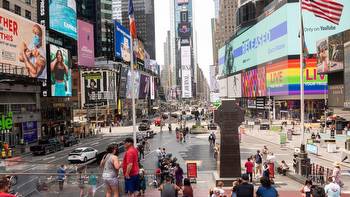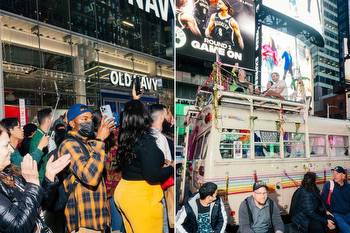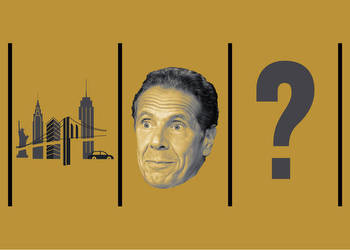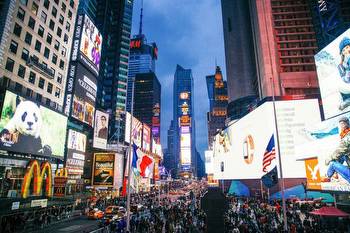A casino in hectic Times Square? This theater critic says heck no.

NEW YORK — That “permanent floating crap game” that good old reliable Nathan is always trying to set up may be coming to Times Square. I’m not talking about “Guys and Dolls” — though that, coincidentally, may be in the cards, too. No, what’s actually being pitched is a casino in the heart of the theater district, a serious proposal that has deeply alarmed the Broadway establishment.
“As if Broadway wasn’t already a gamble,” a Tony-winning director joked to me. But what makes the notion truly untenable is the chaos that Times Square already is, and that a Vegas-style casino would only ramp up. “Hadestown” is at present a mythical place that only exists on the stage of a theater on West 48th Street. Inviting throngs of blackjack and slots and roulette lovers to a neighborhood already nearly impossible to navigate? That could turn the crowded theater district into a bona fide living hell.
On Tuesday, the Broadway League spelled out exactly how awful a notion this is, in a letter that its president, Charlotte St. Martin, distributed to the trade group’s more than 700 theater producers, presenters and general managers — a salvo aimed directly at the pitch to New York state officials for a “Caesars World Times Square” at 1515 Broadway, smack dab in the heart of theaterland, between West 44th and 45th Streets. It’s one of several bids for three new casino licenses the state has authorized for the New York City region, and are expected to be awarded next year.
“The proposed plan to bring a casino to Times Square,” St. Martin wrote, “would introduce widespread economic and operational disruption, unprecedented congestion, and decreased safety and security.” She added that the League’s research indicates that a magnet for gambling would represent a detriment “to the deeply interconnected network of businesses that have made Broadway and Times Square an international destination.”
The idea, put forth by a partnership of Caesars Entertainment and SL Green Realty Corporation does boast some entertainment-world backing: Actors’ Equity, the union representing more than 50,000 actors and stage managers nationwide — including performers in casino hotels — has announced its support. And SL Green Realty, which declares itself “Manhattan’s largest office landlord,” said in a statement on its website that the project would “not only provide billions in tax revenue to New York City and State, it will also accelerate New York’s economic recovery through strategic partnerships with area businesses.”
It may sound too churlishly like Sarah Brown — the Salvation Army “mission doll” of “Guys and Dolls” — to decry the potential intrusion at America’s crossroads of one of America’s favorite recreational pursuits. Times Square, after all, has long been synonymous with activities that are sometimes cross-referenced with vice. (To quote Claude Rains in “Casablanca”: “I’m shocked, shocked to discover that gambling is going on here!”) Broadway producers may resent the new competition, but they have never been reluctant to seize an opportunity when Las Vegas properties have come looking for “product” to fill out their entertainment portfolios. I remember attending a production of “Chicago” at a casino-hotel in Las Vegas some years ago, where ticket holders randomly strolled in and out during the numbers, toting multicolored cocktails in glassware the size of loving cups.
“Come on, Dover, move your bloomin’ arse!” Eliza Doolittle declares from the stands at the Ascot horse races in “My Fair Lady.” “Politics and poker, politics and poker, shuffle up the cards and find the joker,” sing the backroom dealmakers in the musical that won the Pulitzer Prize in 1960, “Fiorello!” Cardsharps and high rollers have run the tables in Broadway shows for eons, from the likes of dashing riverboat gambler Gaylord Ravenal in 1927’s “Show Boat” to dashing poker player Nicky Arnstein in the current revival of “Funny Girl,” with Ramin Karimloo assaying the love interest opposite Lea Michele’s Fanny Brice.
Stakes are what fuel drama, which is why the romance of betting, or the power trips in card playing, fire up so much theater. In “The Gin Game,” D.L. Coburn’s portrait of an elderly man and woman in a nursing home, it’s over increasingly combative rounds at a card table that the pair seal a bond. (The play won Coburn the Pulitzer in 1978.) Another Pulitzer winner now in a blistering Broadway revival, Suzan-Lori Parks’s “Topdog/Underdog,” features as its dramatic linchpin the art of the street hustle, in three-card monte.
Of course, Frank Loesser, Abe Burrows and Jo Swerling’s’ “Guys and Dolls” is the apotheosis of theater’s love affair with holding dice in one’s fist, on the precipice of riches, or disaster. A crackerjack concert-style revival finished up a run last month at the Kennedy Center, with Steven Pasquale and James Monroe Iglehart portraying lovable bad boys Sky Masterson and Nathan Detroit. Now that, with Phillipa Soo as Sarah and Jessie Mueller as Miss Adelaide, should be a sure bet for Broadway.
The metaphor of gambling is perfect for Broadway, where — according to the anecdotal accounts of top producers — only about 30 percent of the commercial productions see a profit. But that doesn’t make gambling itself a good fit for the frenzied district Broadway calls home. The 41 theaters designated as Broadway houses stretch from the Nederlander on West 41st Street north to the Vivian Beaumont at Lincoln Center, off West 65th Street. In between, and concentrated particularly in the 40s and low 50s, are most of those theaters, packed in among myriad restaurants, souvenir shops, hotels, retail stores and food stands. This is not to mention the hawkers and panhandlers and dozens of workers dressed up as Elmos and Transformers and Spidermen.
The first time tourists experience it, the spectacle can seem a magical slice of New York — a kind of everyday “Runyonland,” the teeming opening number of “Guys and Dolls.” Speaking though, as someone who regularly attends theater there at the craziest times, on evenings and weekends, it is hardly what you’d call a concrete garden of earthly delights. The crowds gathering each New Year’s Eve to cheer as that crystal orb drops seem to be (at least from the vantage point of my TV) better managed than on most “normal” nights. That’s when the sidewalks can become so choked with pedestrians that your most powerful instinct is to flee.
Which is why, to me, the prospect of a venue with the drawing power of a casino seems unthinkable. The Broadway League, in its letter, notes that the theater industry is still seeking to rebound from a pandemic shutdown that resulted in tremendous hardship, and that progress is being made: New York is on track to have 57 million visitors by the end of December, exceeding predictions. “Times Square is not Atlantic City or Las Vegas, which exist primarily to promote gambling and are designed accordingly,” the letter rightly points out.
There are hundreds of other venues for gamblers to take their chances. Let’s preserve Broadway as a domain where producers and theater investors are the people who most often place the bets.







